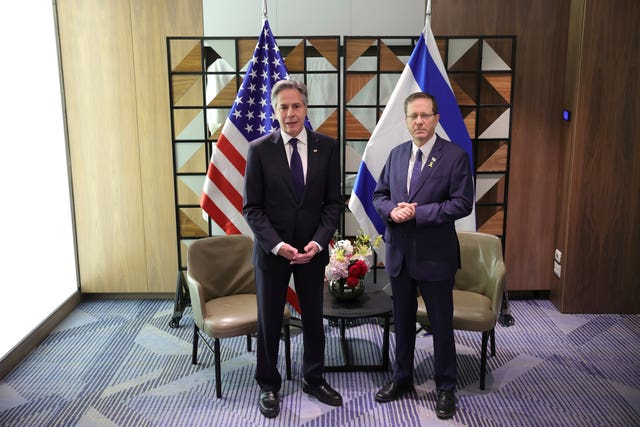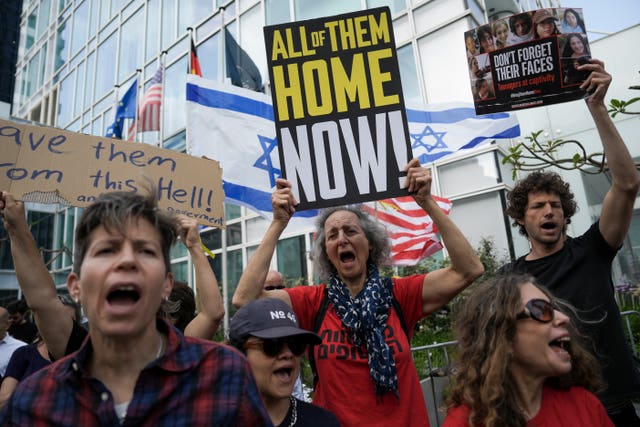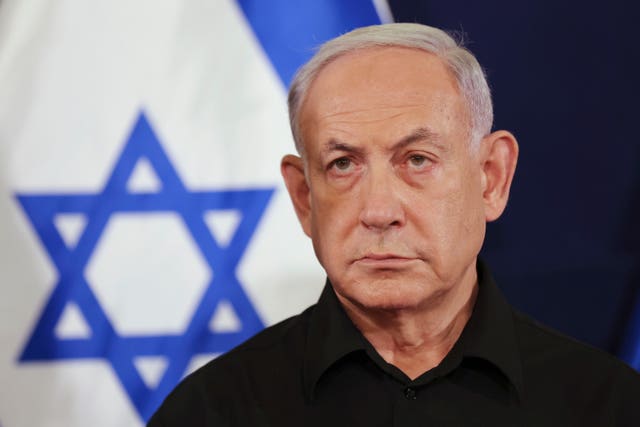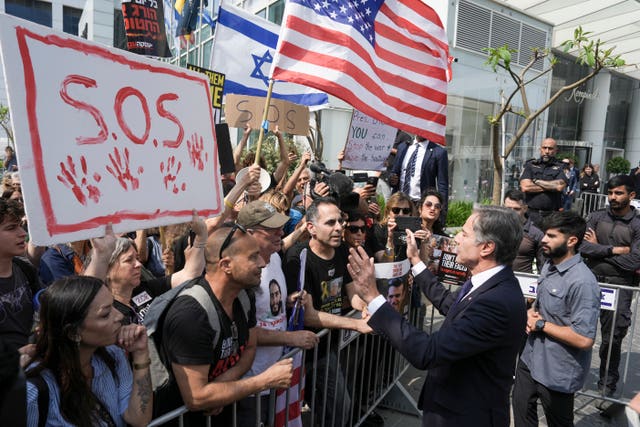Blinken tells Israeli leaders ‘the time is now’ for ceasefire in Gaza
It is the US Secretary of State’s seventh visit since the war between Israel and Hamas broke out last October.

US Secretary of State Antony Blinken is meeting Israeli leaders in his push for a ceasefire deal between Israel and Hamas, saying “the time is now” for an agreement that would free hostages and bring a suspension in the nearly seven months of war in Gaza.
He has said Hamas would bear the blame for any failure to get a deal off the ground.
Mr Blinken is on his seventh visit to the region since the war erupted in October in his bid to secure what has been an elusive deal between Israel and Hamas that could avert an Israeli incursion into the southern Gaza city of Rafah, where hundreds of thousands of Palestinians are sheltering.
The current round of talks appears to be serious, but the sides remain far apart on one key issue – whether the war should end as part of an emerging deal.

“There is a proposal on the table, and, as we’ve said, no delays, no excuses.”
The deal would also allow much-needed food, medicine and water to get into Gaza, he said.
Later, Mr Blinken said Israel has made “very important” compromises in ceasefire efforts and it is now up to Hamas to get the deal done.
“There’s no time for further haggling. The deal is there,” Mr Blinken said, shortly before he was to leave Israel.
After meeting Mr Herzog and also families of Americans held by Hamas at his hotel, Mr Blinken briefly greeted several dozen demonstrators calling for an immediate hostage release deal who had gathered outside.
Chanting “SOS, USA, only you can save the day” and “In Blinken we trust, bring them home to us”, the protesters urged him to make their case to Israeli Prime Minister Benjamin Netanyahu.
Mr Blinken and Mr Netanyahu discussed the ceasefire efforts and Mr Blinken reiterated the US’s position on Rafah, according to State Department spokesman Matthew Miller.
Mr Blinken also spoke of the “improvement” in the delivery of aid to Gaza over the past month and called on Mr Netanyahu to build on that, Mr Miller said.
Mr Blinken told the families there is a very strong proposal on the table and that Hamas needs to say yes to it.
“That is our determination, and we will not rest, we will not stop until you’re reunited with your loved ones,” he said.

But the United States has also criticised Israel for its plan to invade Rafah, Gaza’s southernmost city where some 1.5 million Palestinians are sheltering from fighting elsewhere, saying that any major offensive there would bring potential harm to civilians and should be avoided.
Mr Netanyahu has repeatedly vowed to invade Rafah, which he says is Hamas’s last stronghold, and on Tuesday pledged to do so “with or without” a ceasefire deal.
The deal currently being discussed – with brokering by the US, Egypt and Qatar – would see the release of dozens of hostages in exchange for a six-week halt in fighting as part of an initial phase, according to an Egyptian official and Israeli media.
Hundreds of Palestinian prisoners held by Israel would also be released, including some serving long sentences.
But a sticking point remains over what happens next.
Hamas has demanded assurances that an eventual release of all hostages will bring a complete end to Israel’s nearly seven-month assault in Gaza and a withdrawal of its troops from the devastated territory.
Israel has offered only an extended suspension, vowing to resume its offensive once the first phase of the deal is over.

While the talks appeared to be gaining steam, on Wednesday an Egyptian official said Hamas has asked Egyptian and Qatari mediators to provide clarity on the terms of the latest ceasefire proposal being discussed, a demand that could delay progress.
The official, who has close ties to the talks and who spoke on condition of anonymity in order to freely discuss the deal, said Hamas wants clear terms for the unconditional return of displaced people to the north of Gaza and to ensure that the second stage of the deal will include discussing the gradual and complete withdrawal of all Israeli troops from the entire Gaza Strip.
The official said the current deal does not fully explain who would be allowed to return north and how it would be decided.
While the talks continue, the fighting in Gaza goes on.
Late on Tuesday, an Israeli air strike hit a house in central Rafah, killing at least two children, according to hospital authorities. The bodies were taken to the Abu Yousef al-Najjar hospital.
An Associated Press journalist saw them at the hospital morgue as their relatives mourned the deaths.
On Wednesday, Israel’s military said it is operating in central Gaza, where it said jets struck militants, including one said to be setting up explosives.

The sister of Hamas’s supreme leader Ismail Haniyeh, Sabah Haniyeh, 57, was born in Gaza but has Israeli citizenship and lives in southern Israel. She was arrested in early April and charged on April 21.
She was released to house arrest on Wednesday.
According to the indictment, she sent several messages praising the October 7 attack to WhatsApp groups that seem to include members of the extended Haniyeh family.
Previously, rights groups have accused Israel of cracking down on Palestinian online expression during the war.
Ismail Haniyeh lives in exile in Qatar.
The war was sparked by Hamas’s unprecedented October 7 raid into southern Israel in which militants killed around 1,200 people, mostly civilians, and abducted around 250 hostages.
Israel says the militants are still holding around 100 hostages and the remains of more than 30 others.
The war in Gaza has killed more than 34,000 Palestinians, according to local health officials.
It has driven around 80% of Gaza’s population of 2.3 million from their homes, caused vast destruction in several towns and cities, and pushed northern Gaza to the brink of famine.





